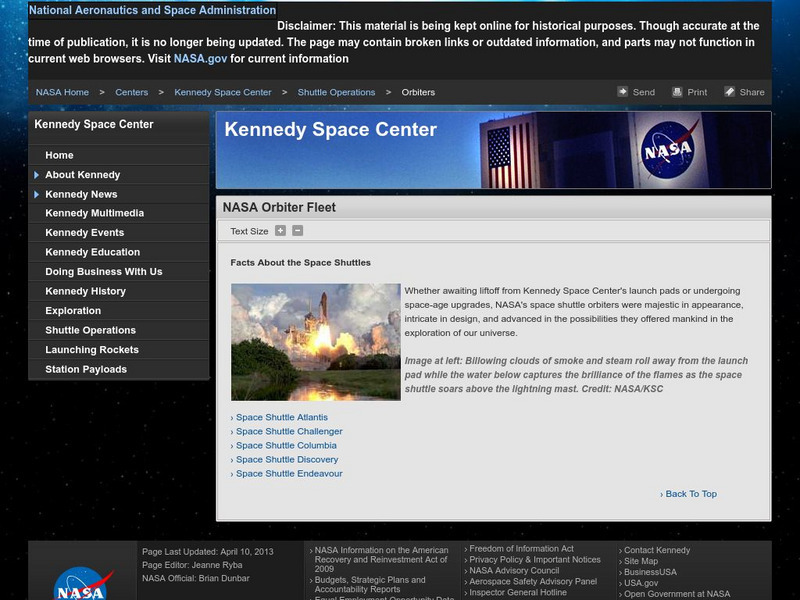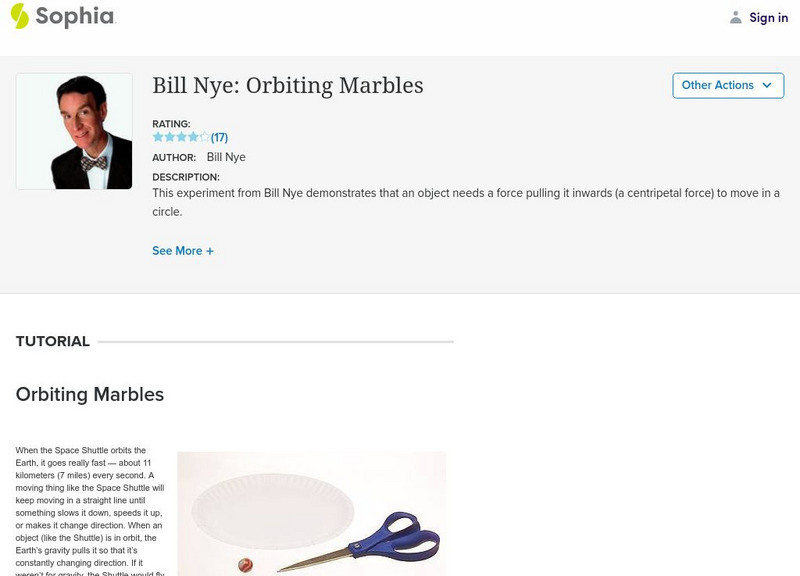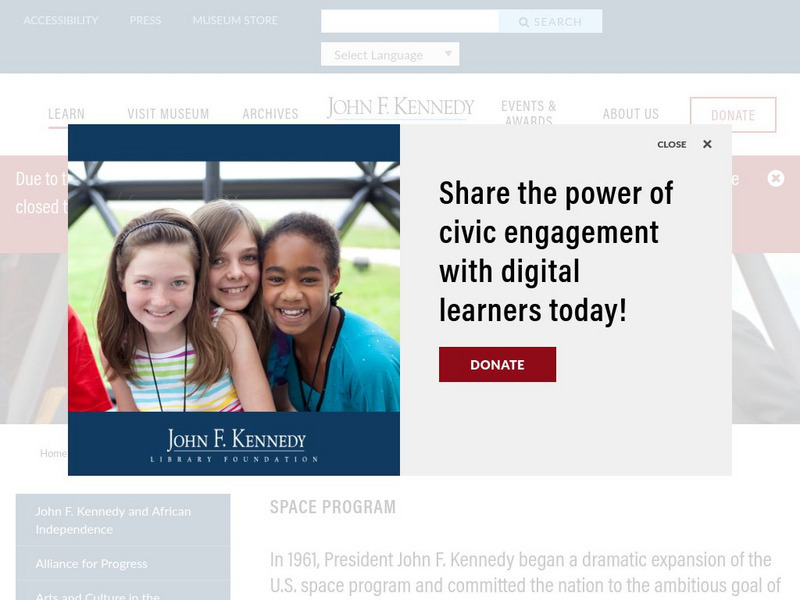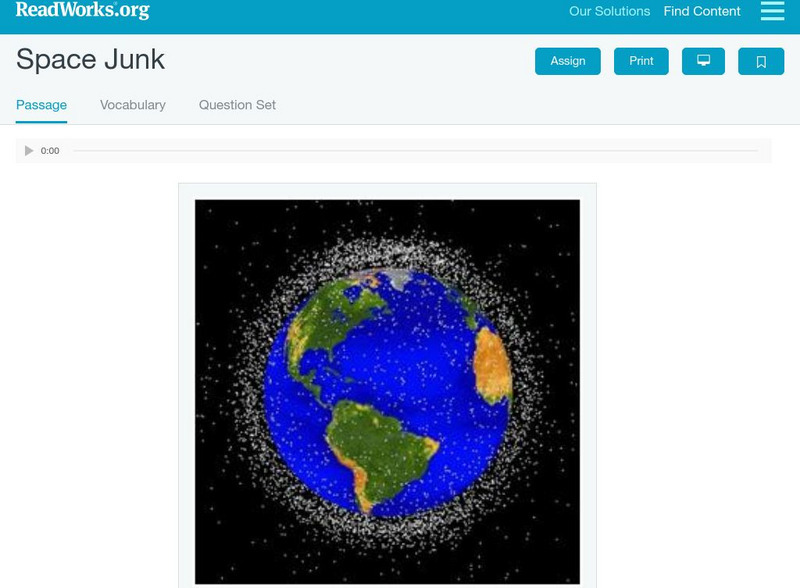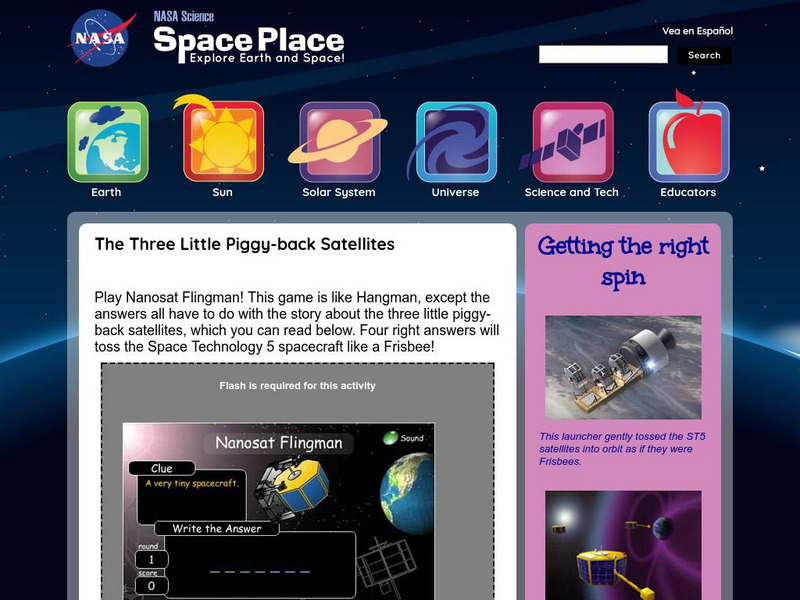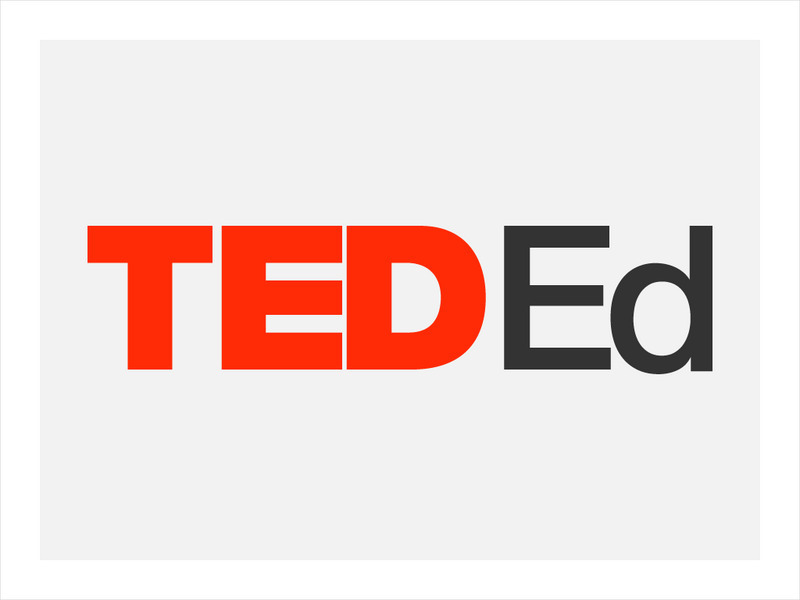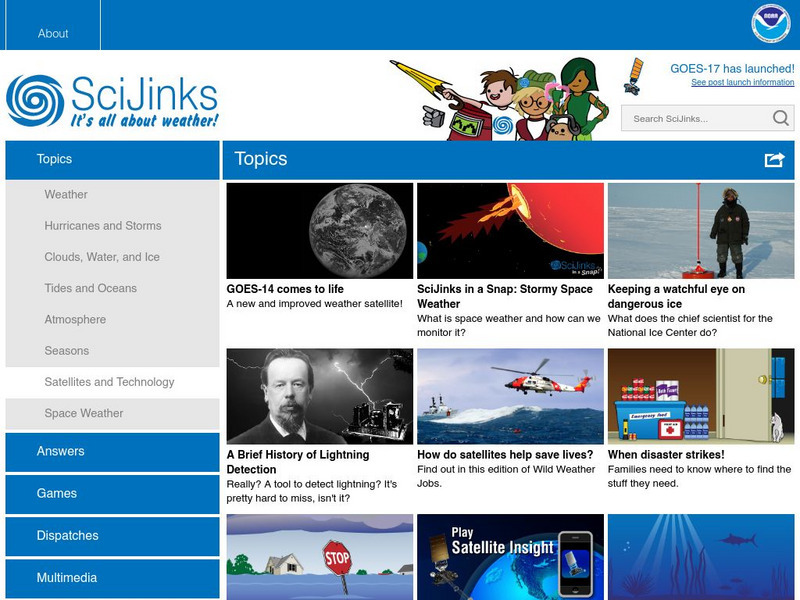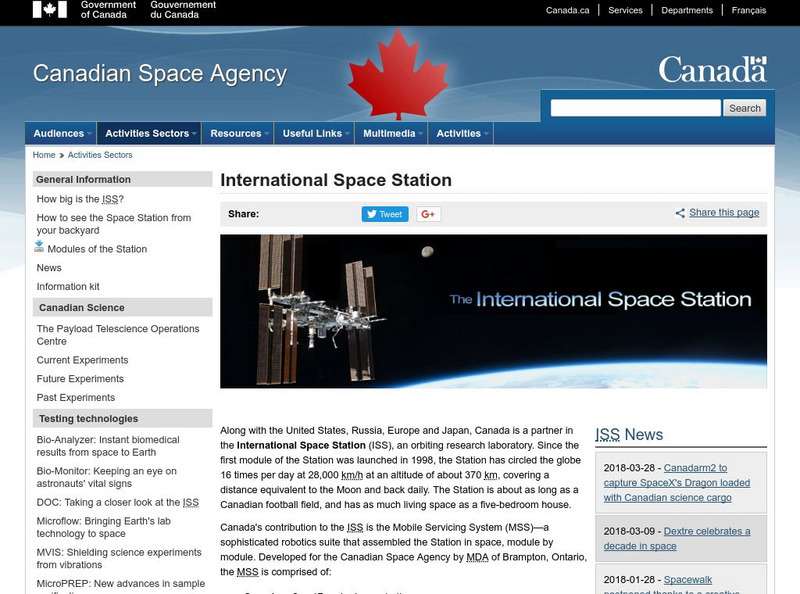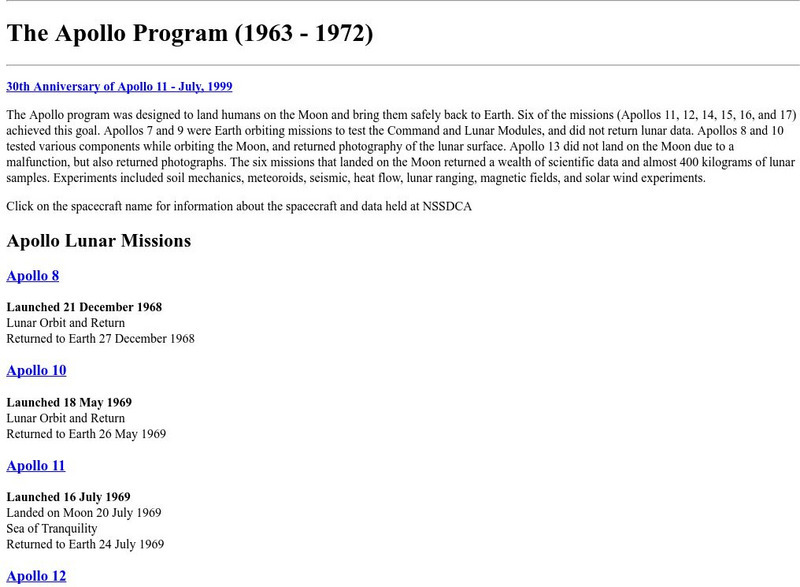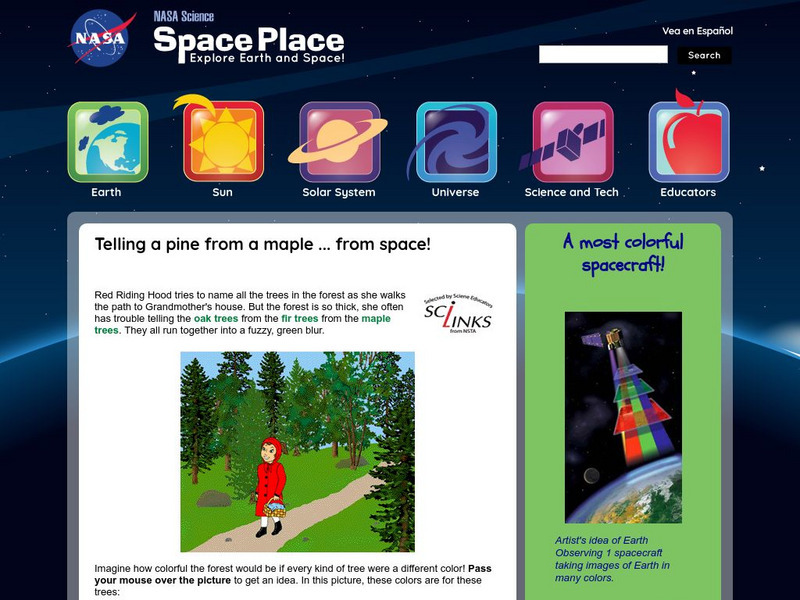Hi, what do you want to do?
NASA
Nasa: Space Shuttle Orbiter Fleet
Resource describes each of the Space Shuttle Orbiters, their specifications and explains their operation. Descriptions of upgrades and modifications are provided. Included is a brief description of how the shuttle is processed to prepare...
Sophia Learning
Sophia: Space Science: Bill Nye: Orbiting Marbles
Created to teach students of the 21st century, SOPHIA is bringing outer space straight to your fingertips. Become the commander of your own learning experiences as you take part in this interactive experiment.
University of Colorado
University of Colorado: Ph Et Interactive Simulations: Gravity and Orbits
Move the sun, earth, moon, and space station to see how it affects their gravitational forces and orbital paths. Visualize the sizes and distances between different heavenly bodies, and turn off gravity to see what would happen without it.
CK-12 Foundation
Ck 12 Exploration Series: Simulations: Physics: Space Station
[Free Registration/Login Required] Learn about orbits in the context of a next generation space station.
University of Colorado
University of Colorado: Ph Et Interactive Simulations: Gravity and Orbits
An interactive simulation that teaches about gravitational force, circular motion, and astronomy by manipulating the sun, earth, moon, and a space station to observe the effects of gravity and orbital paths. This simulation can either be...
John F. Kennedy Presidential Library & Museum
John F. Kennedy Presidential Library and Museum: Space Program
In 1957 the Soviet Union launched the satellite Sputnik and had an astronaut orbit the moon a few years later. The U.S. was shocked and vowed to not be left behind. Examine how JFK rallied the country and Congress to get behind the race...
Read Works
Read Works: Space Junk
[Free Registration/Login Required] An informational text about the problems caused by space junk orbiting the Earth. A question sheet is available to help students build skills in reading comprehension.
NASA
Nasa: The Space Place: The Three Little Piggy Back Satellites
This site from the National Aeronautics and Space Administration allows one to read the "Three Little Piggy-back Satellites," and then play the Nanosat Flingman game. [Requires Shockwave]
NASA
Nasa: The Space Place: Keck Interferometer
This site from the National Aeronautics and Space Administration provides the opportunity to solve a crossword and learn about the world's biggest telescopes.
NASA
Nasa Star Child: Space Travel (Level 1)
Learn about the history of space travel. Audio content is included as well as vocabulary words linked to a glossary of terms.
TED Talks
Ted: Ted Ed: Will Future Spacecraft Fit in Our Pockets?
When you picture a rocket, you might imagine a giant ship carrying lots of fuel, people and supplies. But what if the next wave of spacecraft were small enough to fit into our pockets? Dhonam Pemba details the future of microspacecraft,...
NASA
Nasa: Space Shuttle Basics
Basics of space shuttle operations are explained, including details of launch vehicle and orbiter configuration. Information on each shuttle Enterprise, Columbia, Challenger, Discovery, Atlantis, Endeavour is included. Has video and...
Other
Encyclopedia Astronautica: Manned Spacecraft
An index of all major manned missions into space. A great resource and starting point.
NASA
Nasa Star Child: The Space Shuttle (Level 1)
This site provides a short description of the space shuttle and what it is used for, with diagrams and one quiz question.
NASA
National Aeronautics and Space Administration: Scijinks: Satellites Technology
Describes satellites including what they are used for, important roles they play, how a weather satellite is built, and how a satellite stays in orbit using text and video of varying length.
Government of Canada
Canadian Space Agency: International Space Station
The Canadian Space Agency presents Canada?s partnership in the International Space Station that is orbiting the globe. Canada's contribution is explained and facts about the mission are explained with graphs and pictures. This site...
NASA
Nasa Star Child: Space Travel (Level 2)
This site has the history of space travel. Includes President Kennedy's speeches on the Apollo program that can be downloaded. Many graphics, and a very complete history of space travel with links to more detailed information.
Smithsonian Institution
National Air and Space Museum: Milestones of Flight
This Smithsonian National Air and Space Museum site tells the history of fight with an easy to use timeline. Also, find out about specific flights in the list of links.
NASA
Nasa Star Child: The Hubble Space Telescope (Level 1)
This article for younger students introduces the Hubble Space Telescope and what it is doing in outer space.
Kidport
Kidport: The Space Shuttle
Students can see actual photos of a space shuttle launching from earth as well as the people who now could go because of technology. Learn about some of the equipment and vehicles used to make it happen.
NASA
Nasa Space Science Data Archive: Apollo Program
This is an extensive online review of the 17 Apollo missions. Resources are organized by mission number and include descriptions, mission details, photographs, and scientific data sets.
Smithsonian Institution
National Air and Space Museum: Apollo Program
A comprehensive site focused on all of the Apollo missions. Includes details on launches and moon landings, with charts, statistics, and images. Especially interesting is the list of "Top Ten Apollo Results," which explains the major...
NASA
Nasa: The Space Place: Sorting Out Trees in the Forest
This site from the National Aeronautics and Space Administration provides fun information on the subject. "people can do their jobs even better if they have very accurate images of the ground. Oddly enough, the best way to see lots of...






